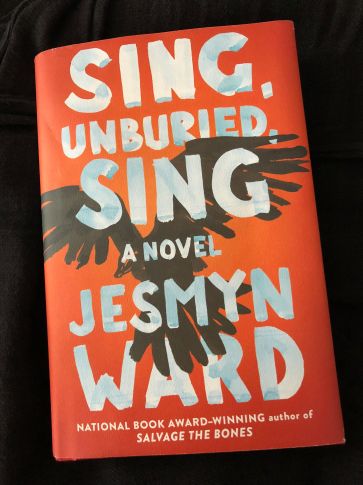 Like Jesmyn Ward’s previous novel set in Bois Sauvage, a Mississippi town of her imagining, “Sing, Unburied, Sing” is achingly honest, unmistakably southern, and award-winningly magnificent. Ward gives her reader no quarter, no way to avoid the heartache and desolation of her characters.
Like Jesmyn Ward’s previous novel set in Bois Sauvage, a Mississippi town of her imagining, “Sing, Unburied, Sing” is achingly honest, unmistakably southern, and award-winningly magnificent. Ward gives her reader no quarter, no way to avoid the heartache and desolation of her characters.
The reader first meets Jojo, a thirteen-year-old boy wise and wizened beyond his years, a nurturing soul devoted to his hard-working grandfather Pop, his dying grandmother Mam, and his feral little sister Michaela.
“I like to think I know what death is. I like to think that it’s something I could look at straight. When Pop tell me he need my help and I see that black knife slid into the belt of his pants, I follow Pop out the house, try to keep my back straight, my shoulders even as a hanger; that’s how Pop walks. I try to look like this is normal and boring so Pop will think I’ve earned these thirteen years, so Pop will know I’m ready to pull what needs to be pulled, separate innards from muscle, organs from cavities. I want Pop to know I can get bloody. Today’s my birthday.”
Then there is Jojo’s mother Leonie, a character who dances on the edge of stereotypes; but Leonie is full-fleshed, simultaneously an archetype and an individual. As a young black woman growing up in poverty in rural Mississippi, Leonie is born into a world with three strikes against her. The intersectionality of her oppressions, her barriers, nearly doom her. When her brother dies in what is deemed by some to be a hunting accident but which is whispered by others to have been a racially-motivated killing, perhaps even a lynching, Leonie and her family are deeply shaken. Somehow, Leonie is drawn to the cousin of one of her brother’s killers, a white boy named Michael who becomes her sun, moon, and stars.
“Because I wanted Michael’s mouth on me, because from the first moment I saw him walking across the grass to where I sat in the shadow of the school sign, he saw me. Saw past skin the color of unmilked coffee, eyes black, lips the color of plums, and saw me. Saw the walking wound I was, and came to be my balm.”
Leonie has kept and named her children after her only love – Jojo after the racist paternal grandfather who won’t even acknowledge his existence and Michaela after the children’s father, a man whose presence in their life has been volatile, unpredictable. But Leonie is incapable of showing maternal love, of putting her children’s needs ahead of hers, of showing any softness when it comes to them. Michael is all she sees, and when he is caught cooking meth and sent to prison upstate, Leonie is set adrift. Her children turn inward and to one another for succor, for life, for love.
“They sleep as one: Michaela wraps herself around Jojo, her head on his armpit, her arm over his chest, her leg over his stomach. Jojo pulls her in to him: his forearm curled under her head and around her neck, his other arm a bar across them both to lay flat against her back. His hand hard in protection, stiff as siding. But their faces make me feel two ways at once: their faces turned toward each other, sleep-smoothed to an infant’s fatness, so soft and open that I want to leave them asleep so they can feel what they will. …But another part of me wants to shake Jojo and Michaela awake, to lean down and yell so they startle and sit up so I don’t have to see the way they turn to each other like plants following the sun across the sky. They are each other’s light.”
Leonie is so hardened, so closed off from her children, that she can’t bear to see their intertwined spirits. What she also fails to see is her complicity; her absence, always emotional, sometimes physical, has driven them to each other. What’s more, her example has only shown them obsessive, destructive love.
Through all of this anguish, even in the depths of horrible circumstances and self-destructive instincts, Ward portrays her characters with love and with hope. She is neither patronizing nor indicting. This is a novel about the bonds of family – blood and chosen, and about just how far they can be stretched. It is a story about a journey through rural, southern poverty in modern America. It is an exposé, an unflinching look at systemic racism, at our own troubled past, and our haunted present.

This sounds great incredibly powerful. One to consider for the future for me….
LikeLike
It is absolutely powerful. It was, incidentally, the first pick for the New York Times Book Review’s Facebook book club, as well. It is interesting to see the varied reactions.
LikeLiked by 1 person
Lovely review! I am on the wait for this at my library. I look forward to it!
LikeLike